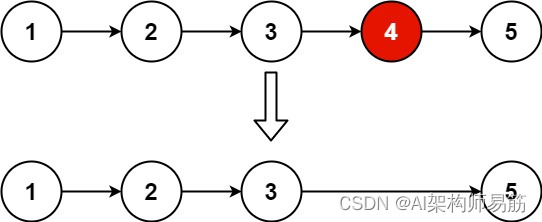19. Remove Nth Node From End of List
Given the head of a linked list, remove the nth node from the end of the list and return its head.
Example 1:

Input: head = [1,2,3,4,5], n = 2
Output: [1,2,3,5]
Example 2:
Input: head = [1], n = 1
Output: []
Example 3:
Input: head = [1,2], n = 1
Output: [1]
Constraints:
- The number of nodes in the list is sz.
- 1 <= sz <= 30
- 0 <= Node.val <= 100
- 1 <= n <= sz
Follow up: Could you do this in one pass?
1. Calculate the total length and subtract N to get the sequence of nodes that need to be skipped
# Definition for singly-linked list.
# class ListNode:
# def __init__(self, val=0, next=None):
# self.val = val
# self.next = next
class Solution:
def removeNthFromEnd(self, head: Optional[ListNode], n: int) -> Optional[ListNode]:
dummy = ListNode(0)
dummy.next = head
first = dummy
l = 0
while first:
l += 1
first = first.next
l -= n
first = dummy
while l > 1:
l -= 1
first = first.next
first.next = first.next.next
return dummy.next
2. Two-pointer solution, keep the distance of N
# Definition for singly-linked list.
# class ListNode:
# def __init__(self, val=0, next=None):
# self.val = val
# self.next = next
class Solution:
def removeNthFromEnd(self, head: Optional[ListNode], n: int) -> Optional[ListNode]:
dummy = ListNode(0)
dummy.next = head
first, second = dummy, dummy
for i in range(n+1):
first = first.next
while first:
first = first.next
second = second.next
second.next = second.next.next
return dummy.next